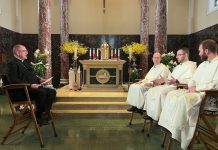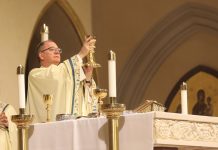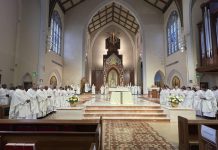Becoming a Catholic is a process of conversion, and one that takes place within the community of the faithful. The Rite of Christian Initiation of Adults is the roadmap for the spiritual journey, a gradual process that varies according to the many forms of God s grace, the free cooperation of the individual, the actions of the church and the circumstances to time and place. (RCIA #5) Some important words to take note of are gradual process, conversion and journey. Conversion happens when conversion happens; it can t really be scheduled ahead of time. So we understand that the Rite of Christian Initiation is celebrated gradually, over a period of time, with major liturgical events that mark important moments in the process. The journey of conversion and initiation into Christ is different for each person.
Period of Evangelization & Precatechumenate, the Inquiry
This is the time when a person inquires at a parish about becoming a Catholic. He or she is gently welcomed into an Inquiry group, where some of their basic questions are answered. It doesn t have any particular time frame it begins for a person when he or she begins an inquiry, and, if wishing to continue, concludes whenever she is ready to become a catechumen.
The responsibility of the parish is to answer questions the inquirer has, and to help them understand God s call. Early in this period, a team member will make use of the Pre-Initiation Inventory form, making sure that there would be no obstacles to the person becoming a Catholic. The inquiry should be long enough so that the desire to come to know Christ, follow Him, and seek baptism can grow. In time, the inquirer and the parish team together discern whether it is appropriate to become a catechumen. The Rite of Acceptance marks the movement from being an inquirer to becoming a catechumen.
The Catechumenate
A catechumen is someone who is learning how to live as a Catholic Christian, coming to know Jesus and the beliefs of the Church. They are joined to the church, and are members of the household of Christ, since the Church nourishes them with the word of God and sustains them by means of liturgical celebrations. (RCIA 47)
Inquirers are welcomed into the Catechumenate through the celebration of the Rite of Acceptance into the Order of Catechumens. During this rite, the candidates are signed with the sign of the Cross, and accept the gospel as the pathway for their journey. During this period, which may last a year or more, the catechumens study the Scriptures and the beliefs of the Church, and come to know Jesus better. They learn to ask how these might call to a conversion of heart and life. The members of their parish are involved as they give witness by their lifestyle, and join together in prayer for them. Their sponsors, usually members of the local parish community, join with them in catechetical sessions, and Breaking Open the Word. Such sponsor-friends are always ready to answer questions and reflect with them on the Catholic way of life. The church has a special rites for the catechumens during this period: Blessings and prayers, and the Anointing with Oil of the Catechumens. This anointing is for strengthening the person to accept the challenges of Christian life, and to understand the gospel more deeply.
After a period of discernment, the catechumens are ready to be fully initiated, that is, to receive the sacraments of Baptism, Confirmation and Eucharist at the Easter Vigil. A major liturgical celebration takes place on the First Sunday of Lent, when the catechumens meet with the bishop at the Rite of Election. Here the Bishop, in God s name, calls the catechumens to the Easter sacraments. Each person signs the Book of the Elect, signifying that they are now among God s Elect, preparing the full initiation.
Period of Purification and Enlightenment
This period coincides with the season of Lent, are is a 40-day period of reflection (and excitement) for the catechumens, now called the elect of the Church. The 3rd, 4th and 5th Sunday of Lent are especially important, with their baptismal themes of water (the Samaritan Woman) , light (the cure of the man born blind) and life (the raising of Lazarus from the dead). At these Masses, the Scrutinies are celebrated, during which we pray that the elect might be strengthened against the sin around them, to uncover then heal all that is weak, or sinful in the hearts of the elect; to bring out, then strengthen all that is upright, strong and good. The whole church prays with the Elect for the graces needed to prepare well to profess their faith in God, and to celebrate the sacraments of Initiation
The Easter Vigil
On this most sacred of all nights, when the Church commemorates the Resurrection of Jesus from the dead, the elect are asked to renounce the devil and profess their faith in God, Christ, the Holy Spirit, and the Church. Before the whole community, they are baptized with water and anointed with the oil of Chrism. They are clothed in the white garment signifying the newness of life. They are now called Christian, and can participate for the first time as members of the faithful in the great Eucharistic Prayer. The crowning moment of their initiation is at the altar when they share for the first time in eating and drinking the Body and Blood of Christ, completing their full transformation into the image of Christ by becoming what they eat.
Mystagogy
During the 50 days of Easter, the Neophytes ( new plants of the church) become a sign to the Church of new life. They continue to reflect together on the extraordinary experience of the sacraments they have received: the water Baptism, the infusion of the Spirit in Confirmation, and participation in the Body and Blood of Christ at the Eucharist. They are invited to reflect on the Sunday gospels, how they connect with the sacraments they have received, and their new life in the Church.
As the period of Mystagogy ends with the feast of Pentecost, the neophytes are sent out to the world as were those first disciples, strengthened by the Holy Spirit for mission. The newly baptized are invited to gather together monthly to continue reflecting on their new life in Christ. In addition, each year all the newest members of the Church are invited to celebrate their initiation.









